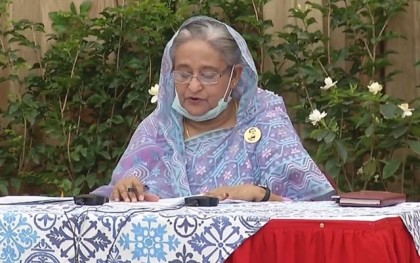SAMI
Published:2020-04-08 07:42:43 BdST
Ensure aid for people outside social safety net: PM
NEWS DESK
Prime Minister Sheikh Hasina has reiterated her concern about helping the poor and low-income people who are not covered under the social safety net.
She has directed officials concerned to prepare a separate list of such people and provide them with help.
She was speaking on Tuesday in a video conference with public representatives and officials of Chattogram and Sylhet divisions.
She took part in the conference from her official residence Ganobhaban.
After her introductory speech, the premier talked with 13 deputy commissioners, public representatives, civil surgeons and other officials to get the latest information about all activities in those districts.
She directed all officials to ensure food for vulnerable people, emphasizing the needs of those who are outside the social safety net.
Sheikh Hasina also directed them to form committees up to the ward level to oversee relief activities.
It is to be recalled that the government declared general holidays on March 26 to ensure social distancing in order to curb the coronavirus outbreak.
As a result, a large number of people in both rural and urban areas, who run their families on daily wages, have become jobless.
A huge number of low-income people moved to the villages from the cities with almost no money in hand.
Around 2.7 crore self-employed people officially have been out of work.
This section of the workforce is more vulnerable during this period of abrupt shutdown, as neither they nor their employers are covered by any sort of bailout or social safety net programmes of the government.
When the government decided to impose a shutdown, the prime minister directed the authorities concerned to prepare a list of these jobless people and provide them with relief goods.
Subsequently, the disaster management and relief ministry sent a letter to the deputy commissioners of all 64 districts, asking them to implement the prime minister's directive in their respective areas.
The letter also asked them to synchronise their lists with those prepared by local affluent people, associations and non-government organisations to avoid any duplication of beneficiaries and to ensure aid for all jobless people.
The distribution of relief began across the country on March 26.
Meanwhile, there have been some complaints of government aid not being made available due to a lack of a final list of people who are outside the social safety net.
The prime minister again asked officials to prepare a separate list for people who usually do not take any type of government relief or help from the government's safety net programmes.
Economists appreciated the prime minister's concern for people's food safety.
They recommended preparing a complete database of the poor and ultra-poor.
The government has to arrange food support for at least 7.7 crore people, said Dr Zahid Hossain, former lead economist at the World Bank Dhaka office.
"As economic activities in the urban informal sector have become stagnant, about 1.18 crore people – 90 percent – of the sector have lost their jobs," he said.
Zahid Hossain said about 1.93 crore people – half of those working in the rural informal sector – had become unemployed.
"On average, about 1.5 people are dependent on every person engaged in work."
It is very unfortunate that the government has no complete database of poor and non-poor people, said the economist.
He urged the government to prepare a complete database to face the present crisis.
A total of 7.5 crore people are now facing food problems, said Dr Binayak Sen, senior research fellow at the Bangladesh Institute of Development Studies.
He said 20 percent of the people are living below the poverty line, and another 20-25 percent are vulnerable non-poor currently staring at poverty.
The government is over-emphasising the stimulus package when it should stress social safety, food security and the health sector, said Binayak.
He said the country has no universal food coverage programme.
According to Finance Division information, around 91 lakh people are receiving support from the government in terms of social safety net programmes. The number will decline through excluding the number of pension beneficiaries.
The Indian Express wrote last week that in order to keep the poor at home, a larger amount of benefits must be sent to them directly.
Otherwise, the poor will have no alternative but to come out in search of livelihood, said the article.
Sheikh Hasina instructed the authorities to take food to the homes of the poor, who are struggling for survival during the shutdown.
She also instructed that baby food, like milk, be added to the relief items.
She asked officials to provide food items for the poor quietly so that their social dignity is not hampered.
"The people who are outside the social safety net programmes will be added to a new list and be given ration cards for Tk10/kg rice," the premier said, reiterating that stern action will be taken against corruption in these tough times.
She asked officials to make special efforts for maintaining the food supply smoothly.
The whole world might face food scarcity as it did after the world wars, said Sheikh Hasina.
"We should take full advantage of our fertile land and cultivate more crops for ourselves as well as for helping other countries if we have additional food," she added.
Unauthorized use or reproduction of The Finance Today content for commercial purposes is strictly prohibited.


